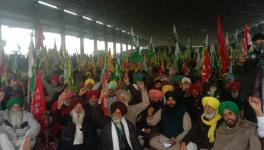‘People are More Important Than Modi,’ Say Farmers on 200th Day of Agitation
The farmers’ agitation on Monday completed 200 days of protest at the borders of the national capital, making it unprecedented in the history of post-Independence India when farmers assembled and mobilised on such a large scale on a singular agenda of compelling the Centre to repeal three central farm laws and ensure a legal guarantee of minimum support price (MSP) for crop.
The talks between the Union government and Samyukta Kisan Morcha (SKM) -- a collective of farmers’ unions -- ended unceremoniously on January 22 this year. The farmer leaders maintain that while the agitation brought an awakening over the agrarian crisis among farmers in particular and common people in general, the path ahead remains crucial given upcoming elections in the states where the movement remains strong, particularly in Uttar Pradesh, Punjab and Uttarakhand.
Pawan Duggal, a farmer leader from All India Kisan Sabha (AIKS), Rajasthan, told NewsClick that the previous 200 days showed the strength of the movement i.e. farmers would endure bone chilling winters, scorching heat and now, troubling storms and rains to fight over an issue that is now matter of life and death to them. He said, “After spending 200 days at the borders, one thing is sure now that the farmers would not go empty handed. What a bad day for a democracy that the government remains mute and deaf even when people hit streets and even made the streets a permanent battleground.”
Commenting on the larger political relevance of the protests, Duggal said, “If I were to look at the larger picture, I can say that the movement brought about an unprecedented unity among workers and farmers. We realised the meaning of the slogan ‘Kisan Mazdoor Ekta Zindabad’ (Hail the unity of workers and farmers). It is us who told the country that there are issues to fight beyond religious hatred. It is this agitation through which people of Haryana and Punjab put aside the issues of water distribution. So, we achieved a lot during the agitation.”
When asked why the government could not be compelled enough to accept the demands, Duggal said that it would be wrong to portray that the farmers could not pressurise the Centre enough. He said, “We have pushed them into a situation where they really do not know the way ahead. They are in ICU. Even their patron organisation Rashtriya Swayamsewak Sangh is fearing people’s wrath and convening repeated meetings now.”
Duggal emphasised that the crucial part with regard to the movement is that there is a wide campaign in Rajasthan and farmers are eagerly waiting for big call from the Morcha. “We are waiting for the big call from SKM and will act accordingly. For the people who still doubt the scope of the agitation should remember that not everybody can sit on border for six months but the support remains intact. When our camps were hit by storm and rains, it hardly took us 48 hours to arrange enough funds to build stronger tents. Why would anybody donate a penny if he does not believe in the cause!” Duggal said.
Furthering the argument of overwhelming support, Inderjit Singh, veteran farmer leader from Haryana Kisan Sabha, told NewsClick that the nearly seven-month long agitation helped farmers in identifying the class character of the government. He said, “The only loss that the farmers made in the agitation is our martyred brothers and sisters who could have died peacefully in their homes. On the brighter note, we established that this government can be challenged and it’s not a big deal if people remain united.” He further said, “The most important thing the agitation brought, I think, it must be a solid assault on casteist structures. It is in this movement that non-farming communities too understood that the farm laws would be dangerous for all. Today, we are marching with farmers from Hisar and they are majorly from the Valmiki and Nai communities. When did you see this unity before?”
When asked what these communities tell him during campaign, he said there were ample instances through which they were understanding the reasons behind their economic predicament. “Cooking oil is now being sold at Rs 200 per kg. We found that the most of mustard was sold to private players in the midst of bleak procurement. When this expensive oil was rolled out in the market, the government suddenly withdrew it from the list of items distributed under the Public Distribution System. It is an essential item without which no kitchen can run. So, they have started realising now,” he said.
Singh added that they are planning to make it a mass movement through wide campaigns in remote areas and it would be focused on non- farming communities now. “The sustenance of the agitation at protest sites and toll plazas under adverse conditions is important achievement for us and we would broaden it now.”
Harinder Bindu, who heads the women’s wing of Bharatiya Kisan Union Ekta Ugrahan, too has another assessment of the 200 days of struggle. Speaking to NewsClick, Bindu said, “While we have been mobilising women for long on different issues, we never expected that the numbers would surpass our expectations. It is the first time that women not only participated but also led the agitation to say that people are more important than Modi. Mind you this happened in a state where people lost their lives over water distribution and the question if Chandigarh would remain with them or not. I can tell you with my experience of campaigning in 1500 villages that more the movement is prolonging, more the participation is coming. The women are still camping outside Reliance shopping malls and Adani silos. And this will only grow strong.”
Amid hostilities from the Centre and adverse heath and weather conditions, the leaders remain firm on the consensus that the Bharatiya Janata Party (BJP) should prepare itself for “Vote ki Chot” (Answer though votes) in election bound states. Jagtar Singh Bajwa, firebrand farmers’ leader from Terai region in Uttarakhand told NewsClick that the the number of youth from borders were strategically reduced so that they can campaign back home against these laws and convince people not to vote for BJP. “We have come through a long journey where we dislodged every slander campaign to brand us Khalistani, Naxal, Maoists, even protesters from one state. The centre failed to understand that it is a spontaneous movement, which is beyond the control of any organisation or individual. We are also firm that the movement would remain peaceful. We would apply democratic means to show our outrage before and after elections. We have given a call for nationwide protests on June 26 at Governor houses. This would amply show our strength,” Bajwa said.
Dharamender Malik from Bharatiya Kisan Union (Tikait) told NewsClick that the agitation made the guarantee of MSP a nationwide issue. “The unique part about the movement remains that the calls for protests are followed even when we do not directly connect with them.” When asked about the movement in upcoming days in election bound Uttar Pradesh, he said farmers have hardly any choice but voting out BJP for survival. “What can you do when a despotic regime stops listening to people in a democracy. We do not have right to recall representatives. So, people are venting our their anger whenever they get opportunities. It was evident in the panchayat elections results when BJP hardly won 18% seats.”
To the question of social impact of the movement, Malik stresses out that it brought together Muslims and Jats in Western Uttar Pradesh who forgot the bitter relations after Muzaffarnagar riots. Similarly, in Rajasthan, Jats and Gurjar communities came together.
Jagmohan Singh from Bharatiya Kisan Union (Dakaunda) said that the Morcha was trying to replicate in Uttar Pradesh what has been done till now done in Punjab and Haryana, where leaders from BJP were socially boycotted. “I understand that this is going to be difficult for us too, but we are not left with any other choice now. After this much respect and support, we cannot go back to villages without victory. For now, we have given the call to observe ‘Save Agriculture, Save Democracy’ day on June 26 by protesting in front of Governors Houses. It is up to the government to understand now if it wants a respectable resolution before the elections.”
Get the latest reports & analysis with people's perspective on Protests, movements & deep analytical videos, discussions of the current affairs in your Telegram app. Subscribe to NewsClick's Telegram channel & get Real-Time updates on stories, as they get published on our website.
























